Module 3 Unit 5 Educational exchanges. Grammar 课件 (共47张PPT)
文档属性
| 名称 | Module 3 Unit 5 Educational exchanges. Grammar 课件 (共47张PPT) |  | |
| 格式 | pptx | ||
| 文件大小 | 2.4MB | ||
| 资源类型 | 教案 | ||
| 版本资源 | 牛津深圳版 | ||
| 科目 | 英语 | ||
| 更新时间 | 2022-06-17 23:20:25 | ||
图片预览

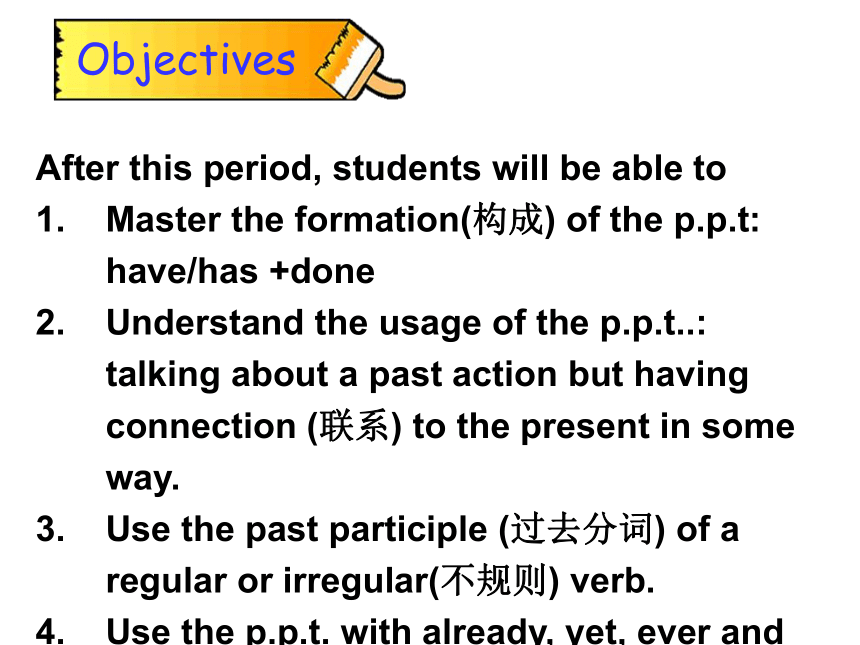
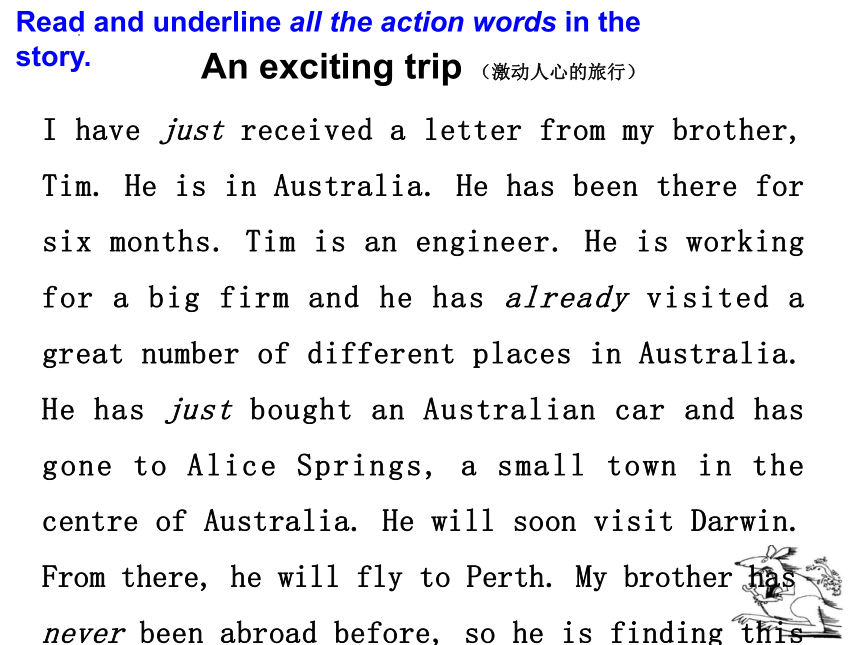


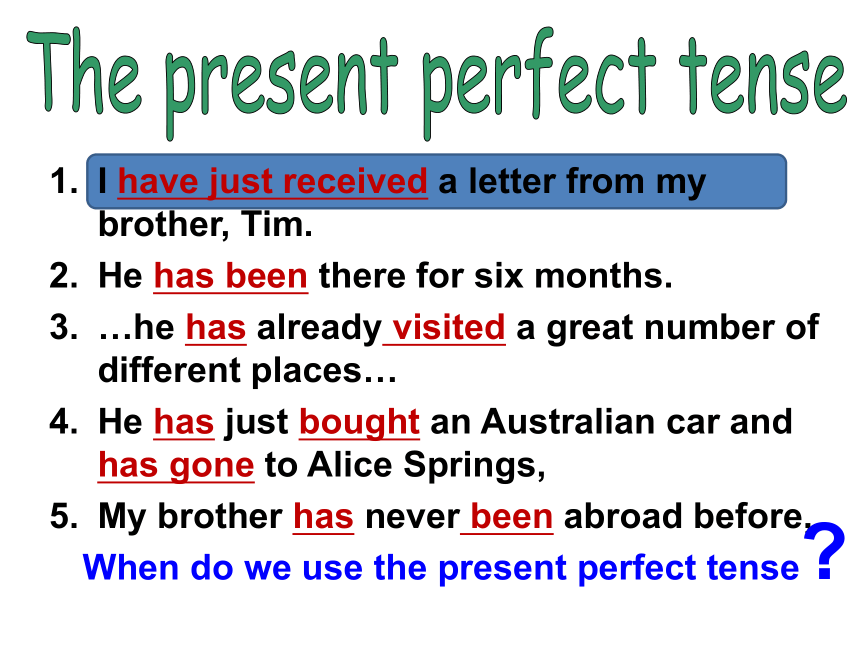
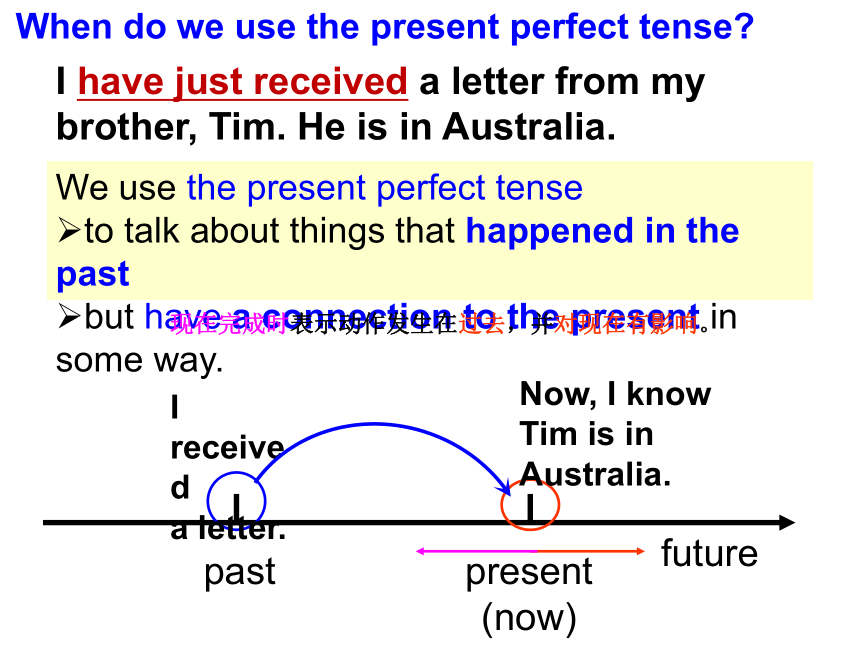
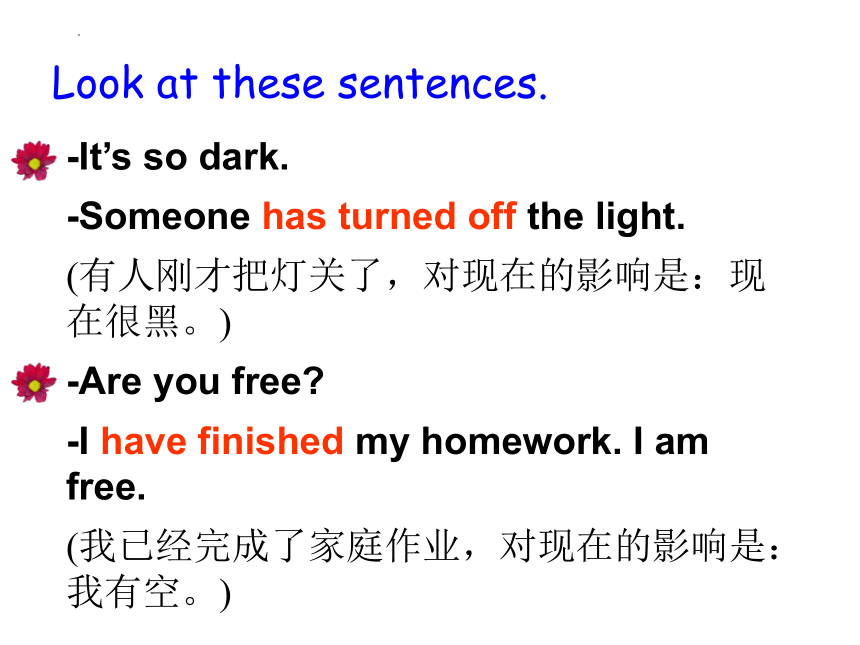

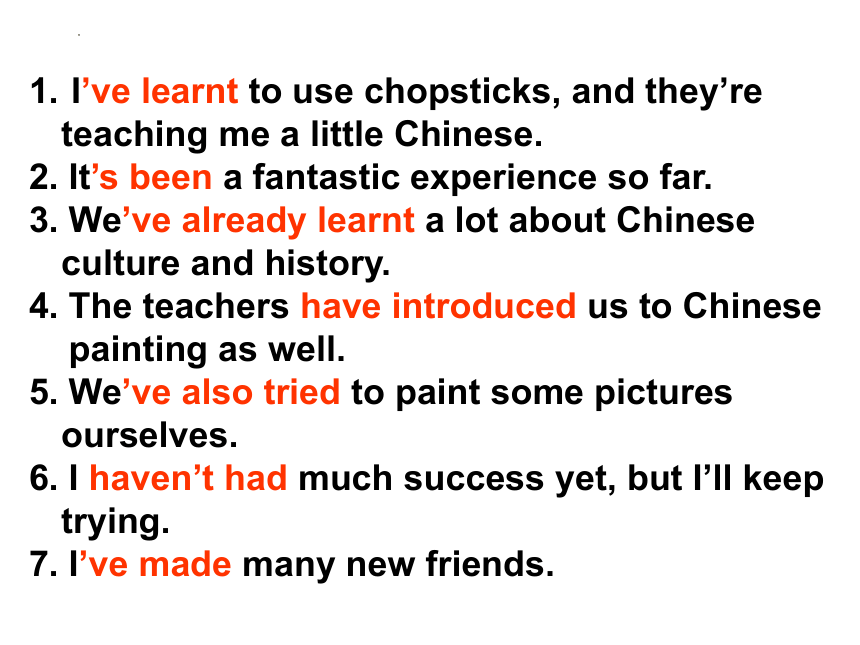
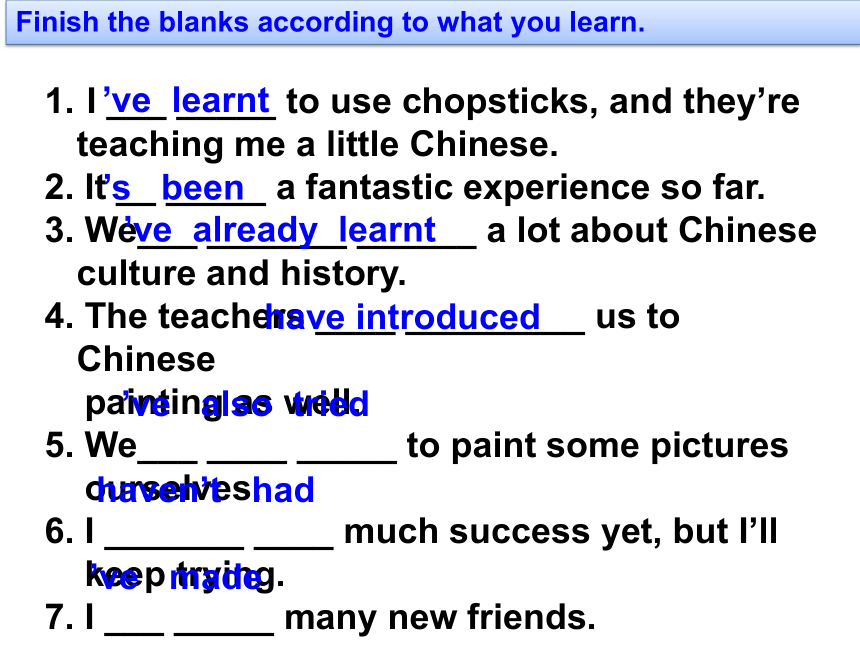

文档简介
(共47张PPT)
Grammar
Unit 5
Educational exchanges
After this period, students will be able to
Master the formation(构成) of the p.p.t: have/has +done
Understand the usage of the p.p.t..:
talking about a past action but having connection (联系) to the present in some way.
Use the past participle (过去分词) of a regular or irregular(不规则) verb.
Use the p.p.t. with already, yet, ever and never.
Objectives
An exciting trip (激动人心的旅行)
I have just received a letter from my brother, Tim. He is in Australia. He has been there for six months. Tim is an engineer. He is working for a big firm and he has already visited a great number of different places in Australia. He has just bought an Australian car and has gone to Alice Springs, a small town in the centre of Australia. He will soon visit Darwin. From there, he will fly to Perth. My brother has never been abroad before, so he is finding this trip very exciting.
Read and underline all the action words in the story.
I have just received a letter from my brother, Tim. He is in Australia. He has been there for six months. Tim is an engineer. He is working for a big firm and he has already visited a great number of different places in Australia. He has just bought an Australian car and has gone to Alice Springs, a small town in the centre of Australia. He will soon visit Darwin. From there, he will fly to Perth. My brother has never been abroad before, so he is finding this trip very exciting.
Underline all the action words in the story.
have just received
is
has been
is
is working
has already visited
has just bought
has gone to
will soon visit
will fly
has never been
is finding
按时态归
类
verbs Tenses
is
is working
is finding
will soon visit
will fly
have just received
has been
has already visited
has just bought
has gone to
has never been
一般现在时
现在时进行时
一般将来时
现
在
完
成
时
The present perfect tense
I have just received a letter from my brother, Tim.
He has been there for six months.
…he has already visited a great number of different places…
He has just bought an Australian car and has gone to Alice Springs,
My brother has never been abroad before,
When do we use the present perfect tense
future
present
(now)
past
I received
a letter.
We use the present perfect tense
to talk about things that happened in the past
but have a connection to the present in some way.
现在完成时表示动作发生在过去,并对现在有影响。
I have just received a letter from my brother, Tim. He is in Australia.
Now, I know Tim is in Australia.
When do we use the present perfect tense
Look at these sentences.
-It’s so dark.
-Someone has turned off the light.
(有人刚才把灯关了,对现在的影响是:现在很黑。)
-Are you free
-I have finished my homework. I am free.
(我已经完成了家庭作业,对现在的影响是:我有空。)
An exchange visit is
educational and interesting!
“I was very nervous at first,” says Sarah. “However, my host family are really friendly. I’m glad to be a guest in their home. I’ve learnt to use chopsticks, and they’re teaching me a little Chinese!”
The students spend the weekdays studying with Chinese students. At the weekend, they tour around Beijing and visit places of interest with their host families.
“It’s been a fantastic experience so far,” says Eric. “I’ve learnt a bit of t’ai chi, and I really enjoy it. We’ve already learnt a lot about Chinese culture and history. The teachers have introduced us to Chinese painting as well. We’ll also try to paint some pictures ourselves! I haven’t had much success yet, but I’ll keep trying.”
“I’ve made many new friends,” says Sarah. “I plan to keep in touch with them when I return home. We’ll see one another soon because they’ll come over to the UK for the second part of the exchange next month. I can’t wait!”
A group of British students from Woodpark School in London are visiting Xinhua Junior High School in Beijing on an educational exchange.
Read the story on P67 and find sentences with the past participle tense.
I’ve learnt to use chopsticks, and they’re teaching me a little Chinese.
2. It’s been a fantastic experience so far.
3. We’ve already learnt a lot about Chinese culture and history.
4. The teachers have introduced us to Chinese
painting as well.
5. We’ve also tried to paint some pictures ourselves.
6. I haven’t had much success yet, but I’ll keep trying.
7. I’ve made many new friends.
I ___ _____ to use chopsticks, and they’re teaching me a little Chinese.
2. It __ _____ a fantastic experience so far.
3. We___ _______ ______ a lot about Chinese culture and history.
4. The teachers ____ _________ us to Chinese
painting as well.
5. We___ ____ _____ to paint some pictures
ourselves.
6. I _______ ____ much success yet, but I’ll
keep trying.
7. I ___ _____ many new friends.
’ve learnt
’s been
’ve already learnt
have introduced
’ve also tried
haven’t had
’ve made
Finish the blanks according to what you learn.
have
has
现在完成时的结构:
have/has+ V-ed
Sentence patterns.
Past participles
A. +ed
B. +d
C. 双写词尾+ed
D. y i +ed
finish
cry
arrive
stop
work
drop
live
study
Irregular Verbs
Verbs
Past tense
Past participle
cost
cost
cost
come
came
come
buy
bought
bought
go
went
gone
A
B
C
A
A
A
A
A
B
B
A
B
1. I __________ (have) dinner. I am full.
2. We ___________ (read) this story.
3. They ___________ (see) the movie.
4. She ____________ (buy) some nice toys.
5. I ______________ (finish) my homework
already.
6. We _____________ (wash) our clothes.
They’re clean now.
have had
have read
have seen
has bought
have finished
have washed
用所给单词的正确形式填空。
I have already seen the Great Wall.
Have you seen the Great Wall yet
No, I haven’t seen the Great Wall yet.
already用于肯定句,yet用于否定句和疑问句并放在句尾。
Have you ever visited the Summer Palace
No, I have never visited the Summer Palace.
现在完成时
一、用法:
表示动作发生在过去,并对现在有影响。(常与already, yet, never, ever, just等词连用)
二、结构:
肯定句:have/has+ V-ed
注意:该句式中的have或has是助动
词,has用于第三人称单数,其它人称
一律用have。
否定句:haven’t (hasn’t)+V-ed
一般疑问句:把助动词 have或has提到主语之前
回答用 Yes, …have (has).
No, …haven’t (hasn’t).
三、标志词:
already 意为“已经”,表示在此之前或某个特定时间之前,一般用于肯定句。如:
We have already met.
我们已经见过面了。
yet 意为“还;尚未”,常用于疑问句或否定句。在疑问句中用来询问某事是否发生,在否定句中用来表示某事尚未发生但有可能发生。
—Have you met yet
—We haven’t met yet.
—你们见过面了吗?
—我们还未见面。
ever 意为“在任何时候;从来”,用于疑问句或否定句。
Have we ever met
我们曾见过面吗?
never 意为“从不”,表示否定意思。
We’ve never met.
我们从未见过面。
含义 用法 例句
already 已经 肯定句 I have already finished
my homework.
just 刚刚 肯定句 She has just cleaned
the kitchen.
ever 曾经 疑问句、否定句 Have you ever visited
the Great Wall
never 从未 否定句 She’s never talked to
a foreigner.
yet 尚未;还未 否定句、疑问句 He has not heard from
her yet.
Has Mr Wang arrived
yet
1. I’ve already had dinner.
I ________ _____ dinner ______.
2. He has just finished his homework.
He ______ _______ his homework ___.
3. I have been to Beijing once.
I _____ _____ _____ to Beijing.
haven’t
had
yet
hasn’t
finished
yet
把下列句子改为否定句。
have never been
past
Beijing
present
(now)
Shanghai
We have been to Beijing.
--Where is Judy
--She has gone to the Great Wall.
present (now)
have been to
Beijing
Shanghai
has gone to
have/has been to
have/has gone to
We have been back.
She’s on the way to the Great Wall
or she’s at the Great Wall now.
四、区分have/has been to 和have/has gone to
have/has been to 表示“曾到过”,说明已经去过某地;
have/has gone to 表示“已去(某地)”,说明正在途中或已到目的地。
试翻译:
He has been to England.
他去过英格兰。
He has gone to England.
他去了英格兰。
(说明已经去过)
(说明正在途中或已到目的地)
A: _________ you ever ________American before
B: Yes, I have. I went there with my parents last year.
A: (Knock, knock) Hello! Aunt Li, is Tom at home
B: No, he ____________Beijing.
A: When did he leave
B: He left last night.
has gone to
been to
Have
Fill in the blanks with have/has been to, have/has gone to
1
2
Team racing
Activity
Two teams have a race. The team that first give a correct sentence get one point.
根据以下图片和文字提示,用现在完成时态补充句子。
Ready
I _______________________________
have taken several photos in Beijing.
take, several photos, Beijing
The boy ___________________________.
not eat; Beijing roast duck
hasn’t eaten Beijing roast duck
My uncle ___________________.
New York; be
has been to New York
They ______________________
_________________.
Hong Kong Disneyland; go; by bike
have gone to Hong Kong
Disneyland by bike
The boy ______________________
already; make a cake
has already made a cake.
___ Tim ____________________
______________
Has ever been to the Palace Museum by bus
Palace Museum, ever be, by bus
the plane, arrive, yet, not
The plane __________________
hasn’t arrived yet.
the Great Wall, never, have been to
Mary ____________________________.
has never been to the Great Wall
Australia, ever, have been to
Have you ____________________
ever been to Australia
The Great Wall; climb; ever
___ she ________________________
Has ever climbed the Great Wall
have met
have played
has cooked
have studied
have seen
haven’t visited
haven’t done
P72
Eric has been in Beijing for a plete his email to his mother with the present perfect tense of the verbs in brackets.
B1 Sarah wants to know whether the students from Beijing have visited any places in London before. Ask and answer questions in pairs. Follow the example.
Pair work
S1: Has Alice ever toured around
Buckingham Palace
S2: No, she hasn’t. She’s never toured
around Buckingham Palace.
S1: Has George ever seen Big Ben
S2: Yes, he has. He saw it one and a half
years ago.
S1: Has he ever visited Tower Bridge
S2: No, he hasn’t. He’s never visited Tower
Bridge.
S1: Has he ever toured around Buckingham
Palace
S2: No, he hasn’t. He’s never toured around
Buckingham Palace.
S1: Has Robin ever seen Big Ben
S2: No, he hasn’t. He’s never seen Big Ben.
S1: Has he ever visited Tower Bridge
S2: Yes, he has. He visited it one year ago.
S1: Has he ever toured around Buckingham
Palace
S2: No, he hasn’t. He’s never toured around
Buckingham Palace.
Pair work
B2 Later Sarah is asking the students from Beijing about what they have and have not done in London. Ask and answer questions in pairs. Follow the example.
S1: Have you done any shopping yet, George
S2: Yes, I’ve already done some shopping.
S1: Have you seen Big Ben yet
S2: No, I haven’t seen it yet.
S1: Have you done any shopping yet, Robin
S2: Yes, I’ve already done some shopping.
S1: Have you seen Big Ben yet
S2: Yes, I’ve already seen it.
我学会了使用筷子,而且他们正在教我一些汉语。
2. 到目前为止,这是一次很棒的经历。
3. 我学了一点儿太极拳,并且我非常喜欢。
4. 我们已经学习了很多中国的文化和历史。
5. 老师们也已经向我们介绍了中国画。
6. 我们还尝试自己完成了一些绘画作品。
7. 我还没有画过一幅像样的图画,但是我会不断尝试。
8. 我已经交了许多新朋友。
1. I’ve learnt to use chopsticks, and they’re teaching me a little Chinese.
2. It’s been a fantastic experience so far.
汉译英。
3. I’ve learnt a bit of t’ai chi, and I really enjoy it.
4. We’ve already learnt a lot about Chinese culture and history.
6. We’ve also tried to paint some pictures ourselves.
5. The teachers have introduced us to Chinese painting as well.
7. I haven’t had much success yet, but I’ll keep trying.
8. I’ve made many new friends.
I. 根据所给词的适当形式填空。
1. I ____ never ____ (read) such an
interesting book.
2. You ______________ (not write) to your
uncle yet. Remember to write to him.
3. — ___ Jack _____ (eat) Chinese food
— Yes, he has.
have read
haven’t written
Has eaten
注: word 文档
点击此处链接
4. Jim has never seen a panda, ____ he
5. We can’t find him anywhere. Perhaps
he ________ (go) home.
6. Mr. Green __________ (teach) us a
lot about social studies since September.
7. I _____never ____ (meet) her sister
before.
has
has gone
have
has taught
met
II. 按要求改写下列句子。(缩略词算一空)
1. Have you watched the film (作否定回答)
____, ___ _______.
2. Simon has decided to go to the meeting.
(改为一般疑问句)
___ Simon ______ __ go to the meeting
3. She’s already finished her homework.
(改为否定句)
She ______ _______ her homework ___.
No I haven’t
Has decided to
hasn’t finished yet
4. I have met Jill and Jim. (对划线部分提问)
_____ _____ ____ met
5. They have visited the Summer Palace and
the Great Wall. (对划线部分提问)
_____ _____ they ______
Who have you
What have visited
III. 汉译英。
他已经找到他的自行车了。
He has already found his bicycle.
2. 你曾经去过北京吗?
Have you ever been to Beijing
3. 他们还没有动身。
They haven’t started yet.
4. 你曾唱过这首英文歌吗?
Have you ever sung this English song
5. 我们从来没有听说过这件事。
We have never heard of it.
6. 我已经做完家庭作业了。
I have already finished my homework.
Homework
1. Make some sentences using the present perfect tense. (at least 10)
2. Finish the exercises in Learning English.
3. Preview Speaking on page 74.
Lesson 28 No parking 禁止停车
Jasper White is one of those rare people who believes in ancient myths. He has just bought a new house in the city, but ever since he moved in, he has had trouble with cars and their owners. When he returns home at night, he always finds that someone has parked a car outside his gate. Because of this, he has not been able to get his own car into his garage even once. Jasper has put up ‘No Parking’signs outside his gate, but these have not had any effect. Now he has put an ugly stone head over the gate. It is one of the ugliest faces I have ever seen. I asked him what it was and he told me that it was Medusa, the Gorgon. Jasper hopes that she will turn cars and their owners to stone. But none of them has been turned to stone yet!
Lily has learned English for five years.
Lily has learned English since five years ago.
for+段时间
since+点时间
present
future
past
learned English
Look at these sentences.
Maggie got sick two days ago.
Maggie has been sick for two days.
(Maggie生病的状态持续了两天。)
Maggie has been sick since two days ago.
(Maggie自从两天前开始生病,到目前已经持续了两天。)
John, clean your teeth please.
Mum, I have already cleaned them.
future
present
past
cleaned teeth
We use the present perfect tense to talk about things that happened in the past but have a connection to the present in some way.
现在完成时表示动作发生在过去,并对现在有影响。
Grammar
Unit 5
Educational exchanges
After this period, students will be able to
Master the formation(构成) of the p.p.t: have/has +done
Understand the usage of the p.p.t..:
talking about a past action but having connection (联系) to the present in some way.
Use the past participle (过去分词) of a regular or irregular(不规则) verb.
Use the p.p.t. with already, yet, ever and never.
Objectives
An exciting trip (激动人心的旅行)
I have just received a letter from my brother, Tim. He is in Australia. He has been there for six months. Tim is an engineer. He is working for a big firm and he has already visited a great number of different places in Australia. He has just bought an Australian car and has gone to Alice Springs, a small town in the centre of Australia. He will soon visit Darwin. From there, he will fly to Perth. My brother has never been abroad before, so he is finding this trip very exciting.
Read and underline all the action words in the story.
I have just received a letter from my brother, Tim. He is in Australia. He has been there for six months. Tim is an engineer. He is working for a big firm and he has already visited a great number of different places in Australia. He has just bought an Australian car and has gone to Alice Springs, a small town in the centre of Australia. He will soon visit Darwin. From there, he will fly to Perth. My brother has never been abroad before, so he is finding this trip very exciting.
Underline all the action words in the story.
have just received
is
has been
is
is working
has already visited
has just bought
has gone to
will soon visit
will fly
has never been
is finding
按时态归
类
verbs Tenses
is
is working
is finding
will soon visit
will fly
have just received
has been
has already visited
has just bought
has gone to
has never been
一般现在时
现在时进行时
一般将来时
现
在
完
成
时
The present perfect tense
I have just received a letter from my brother, Tim.
He has been there for six months.
…he has already visited a great number of different places…
He has just bought an Australian car and has gone to Alice Springs,
My brother has never been abroad before,
When do we use the present perfect tense
future
present
(now)
past
I received
a letter.
We use the present perfect tense
to talk about things that happened in the past
but have a connection to the present in some way.
现在完成时表示动作发生在过去,并对现在有影响。
I have just received a letter from my brother, Tim. He is in Australia.
Now, I know Tim is in Australia.
When do we use the present perfect tense
Look at these sentences.
-It’s so dark.
-Someone has turned off the light.
(有人刚才把灯关了,对现在的影响是:现在很黑。)
-Are you free
-I have finished my homework. I am free.
(我已经完成了家庭作业,对现在的影响是:我有空。)
An exchange visit is
educational and interesting!
“I was very nervous at first,” says Sarah. “However, my host family are really friendly. I’m glad to be a guest in their home. I’ve learnt to use chopsticks, and they’re teaching me a little Chinese!”
The students spend the weekdays studying with Chinese students. At the weekend, they tour around Beijing and visit places of interest with their host families.
“It’s been a fantastic experience so far,” says Eric. “I’ve learnt a bit of t’ai chi, and I really enjoy it. We’ve already learnt a lot about Chinese culture and history. The teachers have introduced us to Chinese painting as well. We’ll also try to paint some pictures ourselves! I haven’t had much success yet, but I’ll keep trying.”
“I’ve made many new friends,” says Sarah. “I plan to keep in touch with them when I return home. We’ll see one another soon because they’ll come over to the UK for the second part of the exchange next month. I can’t wait!”
A group of British students from Woodpark School in London are visiting Xinhua Junior High School in Beijing on an educational exchange.
Read the story on P67 and find sentences with the past participle tense.
I’ve learnt to use chopsticks, and they’re teaching me a little Chinese.
2. It’s been a fantastic experience so far.
3. We’ve already learnt a lot about Chinese culture and history.
4. The teachers have introduced us to Chinese
painting as well.
5. We’ve also tried to paint some pictures ourselves.
6. I haven’t had much success yet, but I’ll keep trying.
7. I’ve made many new friends.
I ___ _____ to use chopsticks, and they’re teaching me a little Chinese.
2. It __ _____ a fantastic experience so far.
3. We___ _______ ______ a lot about Chinese culture and history.
4. The teachers ____ _________ us to Chinese
painting as well.
5. We___ ____ _____ to paint some pictures
ourselves.
6. I _______ ____ much success yet, but I’ll
keep trying.
7. I ___ _____ many new friends.
’ve learnt
’s been
’ve already learnt
have introduced
’ve also tried
haven’t had
’ve made
Finish the blanks according to what you learn.
have
has
现在完成时的结构:
have/has+ V-ed
Sentence patterns.
Past participles
A. +ed
B. +d
C. 双写词尾+ed
D. y i +ed
finish
cry
arrive
stop
work
drop
live
study
Irregular Verbs
Verbs
Past tense
Past participle
cost
cost
cost
come
came
come
buy
bought
bought
go
went
gone
A
B
C
A
A
A
A
A
B
B
A
B
1. I __________ (have) dinner. I am full.
2. We ___________ (read) this story.
3. They ___________ (see) the movie.
4. She ____________ (buy) some nice toys.
5. I ______________ (finish) my homework
already.
6. We _____________ (wash) our clothes.
They’re clean now.
have had
have read
have seen
has bought
have finished
have washed
用所给单词的正确形式填空。
I have already seen the Great Wall.
Have you seen the Great Wall yet
No, I haven’t seen the Great Wall yet.
already用于肯定句,yet用于否定句和疑问句并放在句尾。
Have you ever visited the Summer Palace
No, I have never visited the Summer Palace.
现在完成时
一、用法:
表示动作发生在过去,并对现在有影响。(常与already, yet, never, ever, just等词连用)
二、结构:
肯定句:have/has+ V-ed
注意:该句式中的have或has是助动
词,has用于第三人称单数,其它人称
一律用have。
否定句:haven’t (hasn’t)+V-ed
一般疑问句:把助动词 have或has提到主语之前
回答用 Yes, …have (has).
No, …haven’t (hasn’t).
三、标志词:
already 意为“已经”,表示在此之前或某个特定时间之前,一般用于肯定句。如:
We have already met.
我们已经见过面了。
yet 意为“还;尚未”,常用于疑问句或否定句。在疑问句中用来询问某事是否发生,在否定句中用来表示某事尚未发生但有可能发生。
—Have you met yet
—We haven’t met yet.
—你们见过面了吗?
—我们还未见面。
ever 意为“在任何时候;从来”,用于疑问句或否定句。
Have we ever met
我们曾见过面吗?
never 意为“从不”,表示否定意思。
We’ve never met.
我们从未见过面。
含义 用法 例句
already 已经 肯定句 I have already finished
my homework.
just 刚刚 肯定句 She has just cleaned
the kitchen.
ever 曾经 疑问句、否定句 Have you ever visited
the Great Wall
never 从未 否定句 She’s never talked to
a foreigner.
yet 尚未;还未 否定句、疑问句 He has not heard from
her yet.
Has Mr Wang arrived
yet
1. I’ve already had dinner.
I ________ _____ dinner ______.
2. He has just finished his homework.
He ______ _______ his homework ___.
3. I have been to Beijing once.
I _____ _____ _____ to Beijing.
haven’t
had
yet
hasn’t
finished
yet
把下列句子改为否定句。
have never been
past
Beijing
present
(now)
Shanghai
We have been to Beijing.
--Where is Judy
--She has gone to the Great Wall.
present (now)
have been to
Beijing
Shanghai
has gone to
have/has been to
have/has gone to
We have been back.
She’s on the way to the Great Wall
or she’s at the Great Wall now.
四、区分have/has been to 和have/has gone to
have/has been to 表示“曾到过”,说明已经去过某地;
have/has gone to 表示“已去(某地)”,说明正在途中或已到目的地。
试翻译:
He has been to England.
他去过英格兰。
He has gone to England.
他去了英格兰。
(说明已经去过)
(说明正在途中或已到目的地)
A: _________ you ever ________American before
B: Yes, I have. I went there with my parents last year.
A: (Knock, knock) Hello! Aunt Li, is Tom at home
B: No, he ____________Beijing.
A: When did he leave
B: He left last night.
has gone to
been to
Have
Fill in the blanks with have/has been to, have/has gone to
1
2
Team racing
Activity
Two teams have a race. The team that first give a correct sentence get one point.
根据以下图片和文字提示,用现在完成时态补充句子。
Ready
I _______________________________
have taken several photos in Beijing.
take, several photos, Beijing
The boy ___________________________.
not eat; Beijing roast duck
hasn’t eaten Beijing roast duck
My uncle ___________________.
New York; be
has been to New York
They ______________________
_________________.
Hong Kong Disneyland; go; by bike
have gone to Hong Kong
Disneyland by bike
The boy ______________________
already; make a cake
has already made a cake.
___ Tim ____________________
______________
Has ever been to the Palace Museum by bus
Palace Museum, ever be, by bus
the plane, arrive, yet, not
The plane __________________
hasn’t arrived yet.
the Great Wall, never, have been to
Mary ____________________________.
has never been to the Great Wall
Australia, ever, have been to
Have you ____________________
ever been to Australia
The Great Wall; climb; ever
___ she ________________________
Has ever climbed the Great Wall
have met
have played
has cooked
have studied
have seen
haven’t visited
haven’t done
P72
Eric has been in Beijing for a plete his email to his mother with the present perfect tense of the verbs in brackets.
B1 Sarah wants to know whether the students from Beijing have visited any places in London before. Ask and answer questions in pairs. Follow the example.
Pair work
S1: Has Alice ever toured around
Buckingham Palace
S2: No, she hasn’t. She’s never toured
around Buckingham Palace.
S1: Has George ever seen Big Ben
S2: Yes, he has. He saw it one and a half
years ago.
S1: Has he ever visited Tower Bridge
S2: No, he hasn’t. He’s never visited Tower
Bridge.
S1: Has he ever toured around Buckingham
Palace
S2: No, he hasn’t. He’s never toured around
Buckingham Palace.
S1: Has Robin ever seen Big Ben
S2: No, he hasn’t. He’s never seen Big Ben.
S1: Has he ever visited Tower Bridge
S2: Yes, he has. He visited it one year ago.
S1: Has he ever toured around Buckingham
Palace
S2: No, he hasn’t. He’s never toured around
Buckingham Palace.
Pair work
B2 Later Sarah is asking the students from Beijing about what they have and have not done in London. Ask and answer questions in pairs. Follow the example.
S1: Have you done any shopping yet, George
S2: Yes, I’ve already done some shopping.
S1: Have you seen Big Ben yet
S2: No, I haven’t seen it yet.
S1: Have you done any shopping yet, Robin
S2: Yes, I’ve already done some shopping.
S1: Have you seen Big Ben yet
S2: Yes, I’ve already seen it.
我学会了使用筷子,而且他们正在教我一些汉语。
2. 到目前为止,这是一次很棒的经历。
3. 我学了一点儿太极拳,并且我非常喜欢。
4. 我们已经学习了很多中国的文化和历史。
5. 老师们也已经向我们介绍了中国画。
6. 我们还尝试自己完成了一些绘画作品。
7. 我还没有画过一幅像样的图画,但是我会不断尝试。
8. 我已经交了许多新朋友。
1. I’ve learnt to use chopsticks, and they’re teaching me a little Chinese.
2. It’s been a fantastic experience so far.
汉译英。
3. I’ve learnt a bit of t’ai chi, and I really enjoy it.
4. We’ve already learnt a lot about Chinese culture and history.
6. We’ve also tried to paint some pictures ourselves.
5. The teachers have introduced us to Chinese painting as well.
7. I haven’t had much success yet, but I’ll keep trying.
8. I’ve made many new friends.
I. 根据所给词的适当形式填空。
1. I ____ never ____ (read) such an
interesting book.
2. You ______________ (not write) to your
uncle yet. Remember to write to him.
3. — ___ Jack _____ (eat) Chinese food
— Yes, he has.
have read
haven’t written
Has eaten
注: word 文档
点击此处链接
4. Jim has never seen a panda, ____ he
5. We can’t find him anywhere. Perhaps
he ________ (go) home.
6. Mr. Green __________ (teach) us a
lot about social studies since September.
7. I _____never ____ (meet) her sister
before.
has
has gone
have
has taught
met
II. 按要求改写下列句子。(缩略词算一空)
1. Have you watched the film (作否定回答)
____, ___ _______.
2. Simon has decided to go to the meeting.
(改为一般疑问句)
___ Simon ______ __ go to the meeting
3. She’s already finished her homework.
(改为否定句)
She ______ _______ her homework ___.
No I haven’t
Has decided to
hasn’t finished yet
4. I have met Jill and Jim. (对划线部分提问)
_____ _____ ____ met
5. They have visited the Summer Palace and
the Great Wall. (对划线部分提问)
_____ _____ they ______
Who have you
What have visited
III. 汉译英。
他已经找到他的自行车了。
He has already found his bicycle.
2. 你曾经去过北京吗?
Have you ever been to Beijing
3. 他们还没有动身。
They haven’t started yet.
4. 你曾唱过这首英文歌吗?
Have you ever sung this English song
5. 我们从来没有听说过这件事。
We have never heard of it.
6. 我已经做完家庭作业了。
I have already finished my homework.
Homework
1. Make some sentences using the present perfect tense. (at least 10)
2. Finish the exercises in Learning English.
3. Preview Speaking on page 74.
Lesson 28 No parking 禁止停车
Jasper White is one of those rare people who believes in ancient myths. He has just bought a new house in the city, but ever since he moved in, he has had trouble with cars and their owners. When he returns home at night, he always finds that someone has parked a car outside his gate. Because of this, he has not been able to get his own car into his garage even once. Jasper has put up ‘No Parking’signs outside his gate, but these have not had any effect. Now he has put an ugly stone head over the gate. It is one of the ugliest faces I have ever seen. I asked him what it was and he told me that it was Medusa, the Gorgon. Jasper hopes that she will turn cars and their owners to stone. But none of them has been turned to stone yet!
Lily has learned English for five years.
Lily has learned English since five years ago.
for+段时间
since+点时间
present
future
past
learned English
Look at these sentences.
Maggie got sick two days ago.
Maggie has been sick for two days.
(Maggie生病的状态持续了两天。)
Maggie has been sick since two days ago.
(Maggie自从两天前开始生病,到目前已经持续了两天。)
John, clean your teeth please.
Mum, I have already cleaned them.
future
present
past
cleaned teeth
We use the present perfect tense to talk about things that happened in the past but have a connection to the present in some way.
现在完成时表示动作发生在过去,并对现在有影响。
